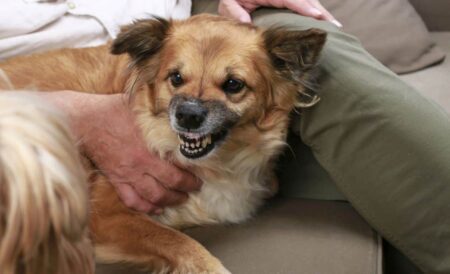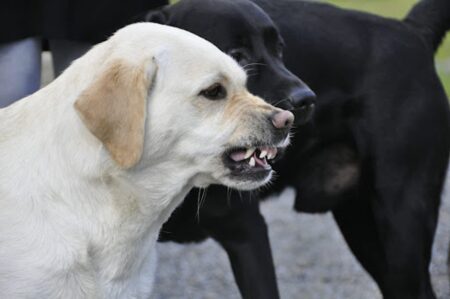
Why is My Dog Growling at Nothing? We Have The Answer
It can be quite unnerving when your furry friend starts growling at seemingly nothing. You might be wondering if your Dog is having a bad dream, hearing something you can’t, or if there might be a more serious issue at play. Understanding the possible causes and addressing the issue can help you keep your pup calm and happy. In this article, you will learn the reasons why your dog might be growling at nothing and how you can handle the situation.
SEE ALSO: Why Is My Dog Barking at Guests and How to Stop It?
Why is My Dog Growling at Nothing? We Have The Answer
There are several reasons why your dog might be growling at nothing, and understanding the cause can help you address the issue effectively. Here are some possible reasons:
1. Hearing:
Dogs have a much more acute sense of hearing than humans, which means that they might be picking up on sounds that we can’t detect. This could be the reason your dog is growling.
2. Sensory Issues:
Dogs can also be sensitive to smells, sights, and other sensory stimuli that we might not be aware of.
3. Age-related Issues:
As dogs age, they may start to develop issues such as dementia or other cognitive problems that can cause them to become confused or disoriented. This may lead to them growling at nothing as they try to make sense of their surroundings.
4. Medical Issues:
In some cases, growling at nothing may be a sign of an underlying medical issue such as pain or discomfort. If your dog has recently started growling at nothing and there doesn’t seem to be an obvious cause, it’s important to consult with your veterinarian to rule out any health problems.
5. Fear:
Dogs can be fearful of many things, including sounds, people, or unfamiliar objects. If your dog is growling at nothing, it may be a sign of fear or anxiety. Understanding what is causing the fear can help you to address the issue and help your dog feel more comfortable.
6. Territoriality:
Dogs can be very protective of their territory, and they may start growling at nothing if they perceive a threat to their space. This is especially common in breeds that have been bred for guarding or protection.
7. Play:
Some dogs may start growling during play, even when there’s nothing else to growl at. This is usually a harmless form of play-growling and isn’t usually cause for concern. However, if your dog is growling aggressively or seems overly aggressive during play, it may be a sign of a more serious issue.
8. Stress:
Dogs can become stressed for many reasons, including changes in routine or environment. This stress can cause them to growl at nothing as a way of coping with their feelings.
9. Dominance:
Growling at nothing can also be a sign of dominance or aggression in dogs. If your dog is growling at nothing to assert his dominance, it’s important to address the issue as soon as possible to prevent aggressive behavior.
10. Separation Anxiety:
Some dogs may start growling at nothing if they’re feeling anxious or stressed about being left alone. If your dog is growling when you leave the room, it may be a sign of separation anxiety.
Why is My Dog Growling at Nothing at Night?
There are several possible reasons why your dog might be growling at nothing at night:
- Darkness: Dogs have limited vision in low light, which means that they may be growling at nothing because they’re unsure of what’s going on around them. This can be especially true for dogs that are not used to the dark.
- Night Terrors: Dogs can experience nightmares or night terrors, just like humans do. If your dog is growling in his sleep, it may be a sign that he’s experiencing a nightmare.
- Dementia: As mentioned earlier, some dogs may develop cognitive issues such as dementia as they age. If your dog is growling at nothing at night, it could be a sign of confusion or disorientation caused by dementia.
- Stress or Anxiety: Dogs can become stressed or anxious for many reasons, including changes in routine or environment. If your dog is growling at nothing at night, it may be a sign of stress or anxiety that’s related to nighttime changes, such as going to bed or turning off the lights.
- Fear of the Unknown: Dogs are natural predators, and they may be growling at nothing at night because they’re sensing something that they don’t understand or that they find threatening. This can include things like shadows or reflections that they perceive as being “not normal” in their environment.
- Illness: In some cases, growling at nothing at night may be a sign of illness or pain. If your dog is growling at nothing at night and also exhibiting other symptoms such as lethargy or loss of appetite, it’s important to have him checked out by a veterinarian to rule out any health problems.
Why is My Dog Growling in the Corner of the Room?
Most times, a dog growling in the corner of a room means that the dog needs space or is uncomfortable. However, growling is a complex vocalization that also occurs in other situations like fear, stress, anxiety, and territoriality. It is important to understand why your dog is growling, how you can prevent them from escalating their behavior, and when to intervene.
Why is My Dog Growling And Barking at Nothing?
There are several potential reasons why your dog may be growling and barking at nothing, including stress, anxiety, territoriality, fear, or a reaction to sounds or smells that you can’t detect. It’s important to identify the cause of the growling and barking to ensure your dog’s safety and well-being.
What Causes Growling in Dogs?
There are several possible causes of growling in dogs, including:
- Stress: Dogs may growl when they are experiencing stress or anxiety, such as when they are feeling threatened, scared, or uncomfortable.
- Fear: Dogs may growl if they are afraid or feel that they are in danger.
- Territoriality: Dogs may growl if they feel that their territory is being threatened or invaded.
- Pain or Discomfort: Dogs may growl if they are experiencing pain or discomfort, such as when they have a medical condition or injury.
- Aggression: Dogs may growl as a sign of aggression, such as when they feel threatened or are protecting their owner or territory.
- Illness: Some illnesses, such as cognitive decline or neurological problems, can cause dogs to growl.
- Age: Older dogs may growl more frequently as they age, especially if they are experiencing cognitive decline or other age-related health issues.
- Lack of Socialization: Dogs that have not been properly socialized may growl more frequently, especially if they are uncomfortable around other dogs or people.
- Stress Hormones: The release of stress hormones such as cortisol can cause dogs to growl, even if there is no obvious threat or reason for their behavior.
- Genetics: Some breeds of dogs, such as German Shepherds or Rottweilers, are more likely to growl than other breeds due to their genetics.
Dog Breeds That Growl More Than Others
Several dog breeds are known to be more prone to growling than others, including:
- German Shepherds: These dogs are known for their protective nature and may growl to warn off potential threats.
- Rottweilers: Rottweilers are known for being strong and protective, and may growl when they feel threatened.
- Dobermans: Dobermans are known for their intelligence and loyalty, and may growl when they sense danger.
- Chihuahuas: Chihuahuas are known for their high energy and alertness, and may growl to warn off potential threats.
- Pit Bulls: Pit Bulls are often used as guard dogs and may growl to warn off potential intruders.
- Dachshunds: Dachshunds are known for their stubbornness and strong personalities, and may growl to assert their dominance.
How Long Does Growling Last in Dogs?
The length of a dog’s growling can vary, but it can last from a few seconds to several minutes or longer depending on the cause and the individual dog.
What To Do If Your Dog Growls
If your dog growls, it’s important to respond calmly and positively to prevent further aggression or fear. Here’s what you can do:
- Remain calm: Avoid sudden movements or loud noises that may further agitate your dog.
- Determine the cause: Try to identify what is causing your dog to growl. This can help you address the issue.
- Distract or redirect: Try to distract your dog with a toy, a treat, or a command such as “sit” or “stay.”
How Do I Stop My Dog from Growling for No Reason?
To stop your dog from growling for no apparent reason, it’s important to address the root cause of the growling. Here’s what you can do:
- Consult with a veterinarian: Your veterinarian can help rule out any medical issues that may be causing the growling.
- Increase socialization: If your dog isn’t properly socialized, try introducing him to other people and dogs in a controlled, safe environment.
- Use positive reinforcement: Reward your dog with treats, praise, or play when he doesn’t growl.
- Address fear or stress: If your dog is growling due to fear or stress, try to reduce the source of the stress or provide a safe, comfortable place for your dog to retreat to.
- Avoid punishment: Hitting or yelling at your dog for growling may increase aggression and fear, so it’s best to avoid punishment.
- Consult with a professional: If your dog’s growling persists, consider consulting with a professional dog trainer or behaviorist for additional assistance.
- Desensitization: If your dog is growling at certain things, such as new people or other animals, try gradually introducing him to the thing that’s causing him to growl. Start by exposing him to the thing from a distance and reward him when he doesn’t growl.
- Increase exercise: Dogs who are well-exercised are often less likely to exhibit aggressive behaviors, such as growling.
Are There Any Side Effects of Growlings in Dogs?
Yes, there are some potential side effects of growling in dogs. These include:
- Aggression: If a dog’s growling is due to aggression or fear, it may escalate to more serious aggressive behaviors, such as snapping or biting.
- Social isolation: A dog that growls frequently may become isolated from other dogs and people, which can lead to additional behavioral issues.
SEE ALSO: 7 Reasons Why Dogs Don’t Like Their Paws Touched
FAQs:
Q. How do you respond when your dog growls?
Respond calmly, try to determine the cause, and use positive reinforcement. Avoid punishment and consult a professional if necessary.
Q. Why does my dog growl at me at night when I pet him?
Your dog may growl at night due to stress, anxiety, or age-related issues. Consult a vet and provide a comfortable space for your pet.
Q. What does a low growl from a dog mean?
A low growl from a dog can mean different things, such as warning, fear, or discomfort. Observe your dog’s body language for clues.
Q. When should I be concerned about my dog growling?
You should be concerned if the growling is accompanied by other aggressive behaviors or if it is unprovoked.


